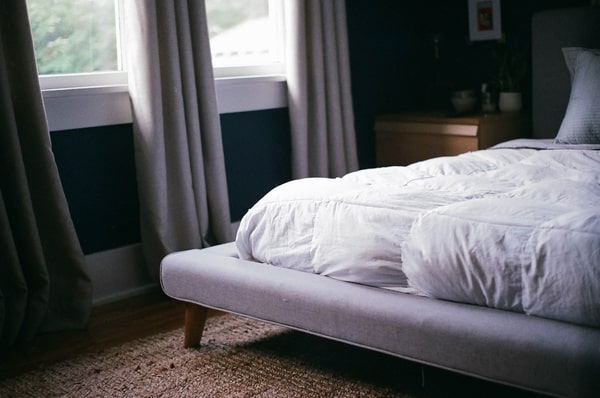 Cherished readers, it has come to this. Let us speak as friends do—honestly, without filters. Dear reader, your mattress is a breeding ground for some nasty things, I don’t even want to start enumerating them!
Cherished readers, it has come to this. Let us speak as friends do—honestly, without filters. Dear reader, your mattress is a breeding ground for some nasty things, I don’t even want to start enumerating them!
Read this if you want to gross yourself out about just HOW dirty a mattress can get. Everything from sweat to dead skins cells to urine can infiltrate your mattress and create the wrong sort of living situation for you and the right one for
We should regularly clean our mattresses to keep dust mites, allergens and bacteria at bay and to rid it of any bodily fluids. I haven’t even mentioned the possibility of bedbugs, which feed on human blood and are difficult and often expensive to eliminate. You don’t want bed bugs.
In this case, what we can’t see can definitely harm us. We will spend a third of your life on our sleeping surfaces. Let us agree that our mattress is important and give it a thorough cleaning at least as often as we should change the batteries in our smoke and CO2 detectors.
That’s every six months, OK?
Since there are layers to your sleep cocoon, attack the cleaning of it in the same way.
Clean stains immediately.
Spilt drinks or food, blood, urine, vomit. Don’t let it sit. You’ll want to stop those things from seeping deep into the mattress where it becomes ever harder to clean out. Clean them right away. And let it dry completely when you do. Moisture creates the exact right environment for bacteria and bed bugs to grow, which is the exact wrong environment for humans.
Some leave-on or scrape-off DIY solutions using baking soda will do the trick for most of the issues you might face, including if you’re potty training a child or sleep with a pet and urine might be a problem. Hydrogen peroxide-based interventions will help with blood stains.
There are a number of great homemade cleaning products to help you clean urine and blood from your mattress.
You can clean the messes in an environmentally and economically friendly way. Just do it right away!
Air it out every day.
We sweat at night. Not a lot, not like we’re doing a Soul Cycle class or anything, but enough so that our mattress can trap some of our moisture each night. Our body is busy flushing out the bad stuff, repairing tissue and helping us recover and recharge. That takes energy.
If we regularly remove all of the stuff and linens on top, open up the windows for some cleansing and drying sunlight and let it breathe, it reduces the moisture inside the mattress.
Change your sheets every week.
And when you wash your bed linens (warm water, please!) avoid the caveman’s desire to shove all of them into one load. Overloading the washing machine will only give you back half washed sheets. The water needs to get all up in there to come back thoroughly cleaned.
Don’t leave pillows neglected.
While cleaning a memory foam pillow can be tricky, most types of pillows can simply use a cycle or two for nasty stains and odours to go away. However, if you fail to upkeep property hygiene, you risk hazards like mould, dust mites or even worse.
Vacuum the cooties away when you vacuum your floors each week.
Most vacuums have handheld attachments that you can pull out for spot duty if you spill something or have extra cookie crumbs or the like loitering about atop your bed. You’ll be removing dust mites during this process, too.
However, if you want up-to-standard professional results – hire our carpet cleaning service and benefit from high-end gear and outstanding results.
Always use a mattress protector.
The mattress protector will block anything that’s coming out of or from your own body. It will significantly reduce bacteria. Since some bacteria begins on the backs of our dead skin cells, we need to do the extra mile to keep them out. You can find waterproof and washable mattress protectors that will act as an extra layer of defence.
Thinking of a new mattress?
You can guarantee a clean mattress if you start with a brand new one and take care of it with the vigilance of a 20-year old girl addicted to K-pop. Mattresses used daily (read: not the one in the guest room) should be replaced every 8-10 years. The quality of your mattress degrades over time and exceptionally dirty ones degrade more rapidly.
If regular use plus a little neglect equals a mattress that no longer properly supports your body, you’ve just opened up Pandora’s box to potential issues ranging from a small annoyance (oooh, sore neck; waking up too early) to major problems (insomnia, back pain, numbness).
If you want to buy a new mattress, you needn’t be intimidated by the endless choices. Reading some reviews will quickly educate you on the myriad options for each type of sleeper (side, back, stomach), the different materials (foam, gel, coils) and the specific construction that each company features in their mattresses.
Once you have a handle on the options, you can start narrowing things down for your specific needs by looking at the best choices in each category.
A first step
Every single adult on the planet older than 18 needs between 7-9 hours of sleep every night to help maintain good physical and mental health. Your bed is important. Your mattress is a lifeline. Commit to having a clean, supportive one and gain peace of mind in the process.









